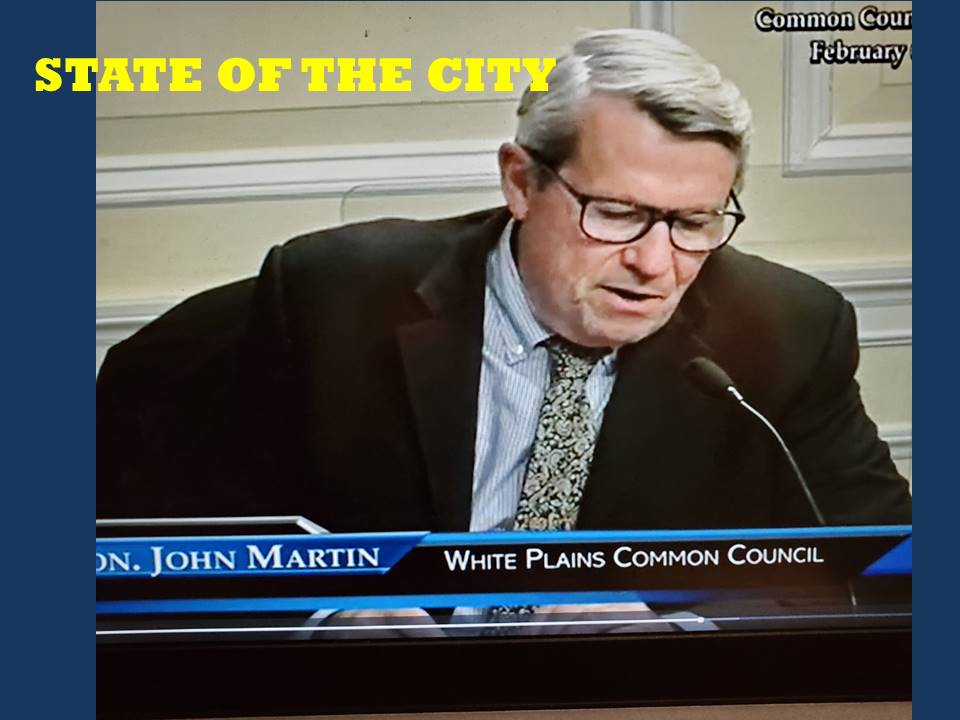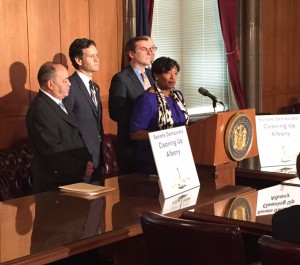Hits: 18
WPCNR ALBANY ROUNDS. From the Office of State Senator Andrea Stewart-Cousins. February 9, 2015:
The Senate Democratic Conference today unveiled a major legislative package to deal with the ongoing ethics crisis in State Government.
This package of groundbreaking bills will cap legislators’ outside incomes, end the LLC loophole, bar elected officials from using campaign funds for criminal defense and personal use and end the practice of taxpayer funded reimbursements of legal fees.
The Senate Democrats also introduced measures to strip corrupt officials of taxpayer funded pensions and reform how campaigns are funded. Unfortunately, the Senate Republican Majority has consistently blocked all meaningful ethics reforms initiatives.
“These scandals have become too common and are something that we must deal with immediately. We are facing a crisis of mistrust in Albany,” Senate Minority Leader Andrea Stewart-Cousins said (shown above in a previous photograh). “The legislation offered by the Senate Democratic Conference will help rebuild the trust in our state government that has been rocked by repeated scandals. I urge the Senate Republicans to end their opposition to cleaning up Albany and finally join with the Senate Democratic Conference to pass these good government reforms.”
The Senate Democratic Conference ethics reforms initiatives are intended to return the public’s trust in state government by restricting outside income, closing loopholes and reforming how campaigns are funded and how campaign funds can be utilized. Bills introduced by the Senate Democratic Conference include legislation that will:
- Restrict Legislators’ Outside Income (Senator Hoylman):
o This initiative will restrict the type and nature of outside income to mirror U.S. Congress’ cap of 15% of gross legislative salary.
o The bill will also establish the Commission on Legislative Compensation that will convene every four years to examine, evaluate, and make recommendations on adequate levels of compensation and non-salary benefits for state legislators.
- Closing the LLC Loophole (Senator Squadron):
o This initiative will close a loophole in current Election Law which does not adequately address the amount of political contributions that a limited liability company (LLC) may make to candidates, parties and political committees.
§ As a result, the State Board of Elections allows LLCs to be treated as individuals for purposes of a limit and, therefore, they can donate up to $150,000 in any one year.
o This legislation would close that loophole and reduce the contribution limit for both LLCs and corporations to $1,000.
- Require Additional Financial Disclosure (Senator Comrie):
o This bill will require state elected officials to disclose the source and nature of all income and report all clients of, or referrals to, a firm or practice the elected officials works at.
o Under this legislation, all reporting must include a clear and complete explanation of the services rendered in exchange for the income or fees earned by the reporting official, or by the firm or corporation with which the elected official practices.
- Prohibit the Taxpayer Reimbursement of Campaign and Legal Defense Fund Accounts for legal fees in Criminal Cases (Democratic Conference Deputy Leader, Senator Gianaris):
o This initiative will prohibit any state reimbursement to a campaign account or legal defense account for attorneys fees and litigation expenses to a public official after an acquittal or dismissal.
- Retroactively Strip Pension Benefits from any State or Local Official Convicted of a Felony involving Breach of Public Trust (Senator Breslin):
o The current law only regulates officials that joined the pension system after 2011 when the last ethics package passed. This legislation will affect all members of the pension system.
o This resolution has been introduced as a constitutional amendment since it affects an official’s pension.
- Strengthen Regulations regarding use of Campaign Funds (Senator Krueger):
o This bill addresses a number of concerns with how campaign funds are raised and expended. Currently, New York’s election law, allowing candidates to spend campaign funds for “any lawful purpose,” is among the most lax in the nation
- Bar the Use of Campaign Money for Criminal Defense (Senator Hoylman):
o This bill will outlaw campaign funds from being used for attorneys fees or any costs for defending against criminal or civil prosecution for alleged violations of any state or federal law.
- Lower Contribution Limits (Democratic Conference Deputy Leader, Senator Gianaris):
o Current state campaign regulations allow donors to provide far greater amounts of contributions than are allowed in other states, or for federal candidates.
o These high limits threaten the integrity of elections in New York State by allowing small numbers of wealthy contributors to disproportionately affect their outcomes. This initiative will drastically reduce the limits on contributions to safeguard the integrity of New York’s elections.
- Cap Contributions to ‘Soft Money’ Accounts (Senator Krueger):
o Currently, donors are able to provide unlimited contributions to soft money accounts. This legislation would reform the campaign finance system by capping donations to soft money accounts at $25,000.
- Require the Disclosure of Bundles (Senator Rivera):
o Under the current law, state campaigns are not required to disclose to the State Board of Election when “bundling” contributions are received. This bill would enhance state campaign finance disclosure reporting requirements by making it necessary for said reports to contain information about those who bundle contributions.
- End Undisclosed Self-Dealing (Senator Hoylman):
o This legislation will create a Class-C and Class-D felony for public servants who knowingly steer public contracts or grants to certain institutions or organizations in order to benefit themselves, their families or a person with whom a public servant has a business or other financial relationship with.
o Self-dealing in the first degree triggers when public contracts have a value in excess of ten thousand dollars.
o Self-dealing in the second degree triggers when public contracts have a value in excess of three thousand dollars.
- Establish a Public Financing System for State Campaigns and Require Greater
Disclosure of Campaign Donations (Senate Minority Leader, Senator Stewart-Cousins):
o Under this legislation, eligible contributions to candidates for statewide office up to $250 would be matched at the rate of $6 for every $1.
o Participating candidates could only receive donations of $2,000
o Candidates who are unopposed in a general or special election may not receive public funds
o All unspent public funds must be returned 30 days after the election.


![IMG_0680[1]](http://whiteplainscnr.com/wp/wp-content/uploads/2014/04/IMG_06801-300x225.jpg)